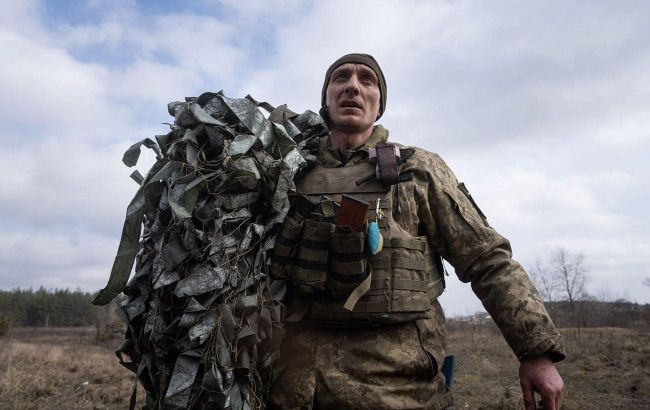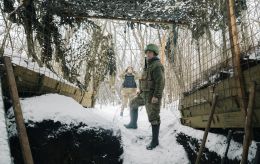Law on mobilization in Ukraine adopted: Brief summary of main amendments
 New law changes rules of mobilization in Ukraine (Photo: facebook.com/easternforce)
New law changes rules of mobilization in Ukraine (Photo: facebook.com/easternforce)
A major bill on mobilization in Ukraine has been approved in the second reading. People's deputies swiftly processed amendments and approved them in the committee version.
RBC-Ukraine talks about how and when mobilization will change in the material below.
Contents
- How the law was adopted and when it will take effect
- No demobilization, but with grounds for discharge
- Mobilization rules: to Territorial Recruitment Centers without draft notice, military ID card on hand, and e-cabinet
- New conscription procedure. What will replace compulsory military service
- Expansion of powers of the TRCs and penalties for evaders
- Bonuses for military personnel and motivational package
- Who is eligible for deferment from mobilization
- Changes to reservation rules
How the law was adopted and when it will take effect
Yesterday was devoted to considering over 4,000 amendments rejected by the profile committee on national security, defense, and intelligence. The session lasted into the late night, with only a few dozen MPs present. Therefore, no changes were made.
Today, about 30 committee amendments were put to confirmation. All of them received a majority of votes. An amendment regarding demobilization was on the verge of removal from the project, but it was supported by 227 votes in favor.
As a result, bill No. 10449 garnered 283 votes and was adopted in its entirety. Results by factions:
- Servant of the People - 192
- European Solidarity - 0
- Fatherland - 2
- Platform for Life and Peace - 18
- Holos - 16
- Restoration of Ukraine - 16
- For the Future - 12
- Trust - 15
- Non-faction - 12
According to the procedure, the law must first be signed by the Speaker of the Verkhovna Rada, Ruslan Stefanchuk, before it is passed to the President for signature. It could be delayed if there is a resolution to cancel the voting results.
"It is not yet known if anyone will file a motion to block by the speaker," said MP Yaroslav Zheleznyak.
The new mobilization law will take effect one month after Volodymyr Zelenskyy signs it.
The document introduces new obligations for conscripted Ukrainians, a revised mobilization process, and penalties for evaders, among other changes. Below are the key amendments.
No demobilization, but with grounds for discharge
The proposal for demobilizing soldiers after 36 months of service and rotation was in the government version. But it was removed at the request of the Commander-in-Chief of the Armed Forces of Ukraine, Oleksandr Syrskyi. Ministry of Defense representative Dmytro Lazutkin explained that there were "requests from the General Staff given the operational situation on the front." Russia is advancing on multiple fronts, so the defense forces must be strong. Within 8 months, a separate law regulating rotation and mobilization issues should be developed.
Today, demobilization was finally removed from the draft law before the final vote. However, the amendment on exclusion was on the verge of failure, as it was supported by 227 votes (the minimum required was 226).
However, former prisoners of war (involuntary surrender), disabled veterans, generals (by decision of military leadership), contractors whose contracts have expired, and military personnel appointed by judges or elected as deputies will be able to be released from military service.
Military personnel with disabilities of all groups also have the right to be discharged. But by the end of 2024, all men aged 25-55 classified as disabled II and III groups after February 24, 2022, must undergo a re-evaluation for fitness for service. This does not apply to those who became disabled II and III groups due to illness or injury during the defense of Ukraine.
Women can be released due to pregnancy or childcare leave, large families, single parents, and other categories.
Mobilization rules: to Territorial Recruitment Centers without draft notice, military ID card on hand, and e-cabinet
Within 60 days of the law taking effect, all conscripted individuals must visit their Territorial Recruitment Centers (TRCs) to clarify their registration data. This can also be done remotely through the electronic cabinet.
The law removed the provision for mandatory registration in the e-cabinet and any references to draft notices that were supposed to be sent through it. The electronic cabinet remains a right, not an obligation.
At the same time, when updating their data, Ukrainians must inform the TRCs of all personal details, including phone numbers and email addresses. The notification procedure may change in the future.
All conscripted Ukrainians must carry their military ID card or temporary certificate and present it upon request by a military representative. Currently, police officers can check documents.
People with disabilities (for contract service), former prisoners of war, and youth under 25 years old after basic military training or service can volunteer for mobilization if they wish.
New conscription procedure. What will replace compulsory military service
The law abolishes mandatory military service and introduces basic military training for Ukrainians aged 18-25. They can choose the year and period of service until they reach the age of 24.
The term is up to five months in peacetime and three months in wartime. Specifically, in peacetime, up to three months of basic military training and up to two months of professional training. In wartime, at least one month of basic training and up to two months of professional training.
Basic military training will be introduced in all forms of higher education institutions starting in 2025, regardless of ownership. It will be mandatory for boys and voluntary for girls. After training, a military registration specialty will be assigned, and conscripts will be registered accordingly.
Expansion of powers of the TRCs and penalties for evaders
At the request of the TRC head, the police will conduct administrative detention of conscripts who do not appear at the military enlistment office upon draft notices. Previously, the police could detain those who had already been protocolled at the TRC for up to three hours.
If the police cannot locate the conscript, the TRC head will demand an appearance by registered mail. If this is ignored, procedures will be initiated against the evader.
Furthermore, the law removed the provision for arresting accounts and imposing travel bans abroad. However, temporary restrictions on driving remain in place.
If an evader does not appear at the TRC within ten days of receiving the letter, the military enlistment office will request the court to suspend their driving license. This restriction will remain in effect until the evader appears at the TRC or the request is withdrawn.
However, not all evaders are subject to this measure. The court will deny the military enlistment office if:
- the restriction deprives a person of means of existence
- the vehicle is used due to disability (or there is a disabled person in groups I or II, or a disabled child)
Bonuses for military personnel and motivational package
The law includes a so-called motivational package. Specifically, mobilized individuals will be compensated 50% of the initial mortgage contribution. Additionally, they will receive payments of 100,000 hryvnias after the first and second years of service. The Cabinet of Ministers will determine the procedure and conditions.
Primary annual leave will be provided in parts throughout the calendar year (the main continuous part is not less than 15 days). Moreover, spouses of military personnel will be exempt from interest on loans, fines, and penalties (except for auto and housing loans). Assistance in purchasing a car is also promised. A military member will receive a certificate for a car worth 150,000 hryvnias for three months after signing the first contract.
The law also establishes counting one month of service as three months for years served directly on the front lines. Additionally, there will be an extra 90-day leave for those released from captivity and a payment of 15 million hryvnias for a deceased soldier. Rewards ranging from 11,500 to 870,000 hryvnias will be set for destroyed or captured equipment.
It is worth noting that volunteer-mobilized individuals will also receive a two-month "reprieve" before being sent to training centers to complete their civilian affairs.
Who is eligible for deferment from mobilization
Deferment remains available for reservists, disabled individuals, those temporarily unfit for service due to health reasons (for 6-12 months), parents of multiple children (except for those in debt for alimony), single parents, parents and guardians of disabled children, orphans under 18 years old, and those permanently caring for a spouse, child, father, or mother.
The circle of individuals who can arrange permanent care has been significantly restricted. Only first-degree family members (husband, children, etc.) can provide care and obtain a postponement. If there are no close relatives, providing care by a second-degree family member is permitted.
As before, deferment is granted to government ministry officials, members of parliament, judges, diplomats, and other civil servants.
Students in full-time or dual forms of education are exempt from mobilization. The primary condition is a higher level of education than previously obtained. This category also includes doctoral students and individuals enrolled in internships. The Cabinet of Ministers proposed denying deferment to contract postgraduate students, but this provision was removed from the law.
Also exempt from mobilization are individuals whose close relatives died or disappeared while performing tasks in the ATO or during Russia's full-scale aggression. Or those who posthumously received the title of Hero of Ukraine for heroism during the Revolution of Dignity.
Changes to reservation rules
Position as a civil servant no longer guarantees exemption from mobilization. Top-ranking officials of category "A," heads of regional and district councils, town mayors, and rural settlement mayors will receive a guaranteed exemption.
Officials of category "B" and local self-government bodies will be exempt based on not more than 50% of the conscripts. Interestingly, starting in 2025, one can enter civil service only after basic military training.
Reservation applies to employees of state authorities, other state bodies (including NABU, National Police, prosecution, State Emergency Service, and others), enterprises, and organizations critical to the Armed Forces of Ukraine, the economy, and the population's livelihood.
A fundamental change is the ability to reserve ultimate beneficiaries of critical enterprises who are not employees. Presumably, changes are also expected for the employees of such enterprises themselves. The law entrusts the Cabinet of Ministers to prepare a new resolution on the reservation procedure. Prime Minister Denys Shmyhal recently announced that the decision will be "fair."

